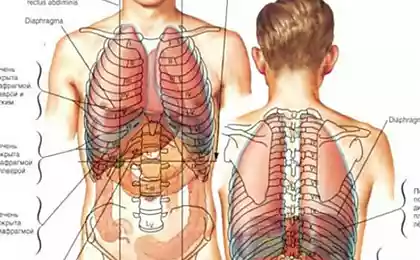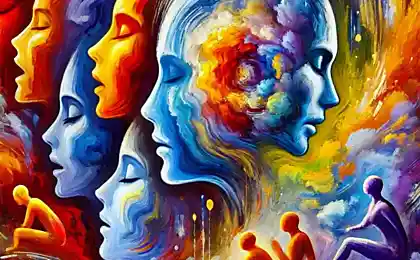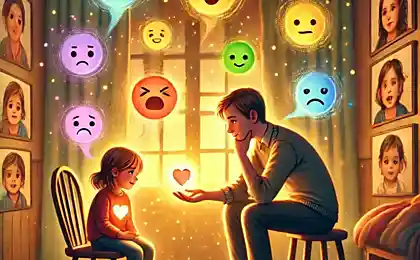532
What likes and dislikes our brain
Sixty eight million three hundred ten thousand four hundred thirteen
1. Specific purpose. Once you formulate for yourself a specific goal, task, then start the miracles. There are resources, opportunities and time for its implementation.
But if you put the main goal, will be able to divide it into components, and calmly, slowly, constantly, step by step will perform them – no problem before you can stand.
2. Positive emotions. Emotions are short-term subjective human response to the world (joy, anger, shame, etc.). Feelings – emotional attitude towards other people, events. Feelings associated with consciousness and can evolve and improve.
The emotions are exciting – increasing human activity, and depressing – that is, inhibit the processes of life. Positive emotions motivate us to action.
They occur when satisfaction. Start looking for the simple pleasures of life – and will start in the brain stimulation – secretion in the body large doses of endorphins, hormones of pleasure, and therefore satisfaction.
So positive emotions, which stimulate and increase your vitality and allow easy flow of mental processes, give rise to a good mood and positive mood to the world.
It is human nature to look for joy – it's not called the survival instinct.
3. The movement and fresh air. Outdoors the blood is actively saturated with oxygen, faster carries oxygen and nutrition to brain cells, strengthens the processes of oxidation, metabolism, is released so we need energy, where new biochemical compounds. The brain causes us to move, to save itself, and us, of course. Give pleasure to think, create, solve complex problems, to have memories.
There is no movement of fresh air, sour blood – brain "sour".
4. Simple food in moderation. Simple food is easier to obtain, prepare, and digest. Brain says (if you want to hear it): buddy, 50% of all the energy received by the body, is spent on vision, 40% on digestion and decontamination of food toxins, and only 10% remains on the movement, the work of mental and nervous systems, fighting billions of microbes. If all the time to eat, when to think?!
It is useful to have soups – they improve digestion, metabolism, faster, fill the stomach, giving a feeling of satiety with less food.
5. Sleep, rest. The brain, like all human body, needs rest. During exercise relaxation – mental activity, with intellectual, physical exercise, moral fatigue – change places.
Proper rest – sleep. Sleep – the most mysterious human condition, without dream man can not live, although the sleep is called "little death."
In the dream, the consciousness is disconnected, but man continues to think, his thinking is changing and is governed by other laws. This is because in the dream to the forefront the subconscious.
The brain analyzes what happened over the past day, according to the new it structures and gives the most likely outcome. This result is perhaps long been predicted, but his consciousness did, he was repressed into the unconscious and removed during sleep.
It is assumed that the brain at night you can give the installation: to make a prediction, decision, exit, conclusion, just a pleasant dream. Unnecessary impression obsession "night wash off a protective wave" of the brain. People are constantly seeing prophetic dreams, most likely good analysts.
6. Addictive. The brain can not instantly adapt to dramatically changed circumstances alien to the new living conditions, new work study residence, company, food, new people. In any activity come in gradually, getting used to it. Every day, making the maximum possible, achieve the impossible. The habit of study, work produced gradually and continuously. Sudden insight and inspiration always involves knowledge, may not always be fully conscious.
Often parents, teachers, bosses, favorite (and we ourselves sometimes) not understanding the complexity of addiction, require us (and other) instant results. It does not happen. It is best not to get upset, calm, good-natured say to yourself or others — not all at once, "Hey kids, let alone time, will you and the protein will whistle." And slowly begin to move, accelerating as addiction.
The brain itself creates stereotypes (habits, skills, reflexes). Stereotyped thinking helps us to live – not have to re-solve common tasks. Each day, performing the same actions, we will make this a habit, skill, ability, reflex. Not including the brain to salivate at the sight of lemon, close the door, the tap, to wash dishes, to flinch from the sharp horn of the car, clicking the cross, when we have to close the program window.
Instinct and a little experience make us from childhood to create stereotypes of friends, enemies, lovers. It helps in the "sea of people" still someone to choose from, assemble your team and at the stop, freeing up time and energy for other life goals. Stereotypes help to communicate with strangers, to get along with parents, to educate their children.
6. Freedom. Albeit limited by the instinct of self-preservation and social rules, it is useful first to ourselves. Freedom is independence from fears and stereotypes. Of course, stereotypes in the form of unconditional and conditional reflexes we need – we will not be burned, the second time to stick your hand in the fire hurts!
But if circumstances require to show his contempt for pain and death – to burn his right hand, as the Roman "military" scaevola. And don't be afraid to think differently and in new ways; to defend your way of thinking, their lives, their appearance, their loved ones. Not to blame the world for misunderstanding and recognize you "just so unusual". And to let others be different from you, have your way of thinking, Outlook on life.
7. Creativity – the ability of the brain, using and relying on the old, create new, and different. Creativity is the favorite work of the brain, brings us to God, making us gods. Creativity in the form of science studies, describes, explains the world and man, proposes ideas, finds ways and means of their realization, looks to the future and ready to change it for the better.
Creativity in form of art – combining work and emotions reflects reality in artistic images. Art brings people together: writer, sharing his life, feelings, describing other people, shows that we are not alone in their experiences.
The artist offers to look like their environment, we ourselves can be beautiful or ugly. Musician sounds of your heart makes a tuning fork to respond to our soul.
Art awakens our imagination, enriches our inner world, helps to see the world in a different light. Art creates ideals.
8. Division, seeding, communication, hugs. Life is a constant cell division, constant metabolism and distribution of information. The nerve cells of the brain neurons – "love".
They are constantly "hugging" touching dendrites (spikes, "hands") each other, always transmit energy (nerve impulses) information about all the (biochemical compounds). Harmful not to share, you can not demand, it's confusing. Head need to be friends with people should be friends.
This is the essence of the brain – he constantly need to get information and give it to.
The brain doesn't like
1. Fear. Depressing, overwhelming life processes emotion. When we feel fear, takes over the survival instinct, brain areas, groups of nervous cells can't join in mental activity. Man loses creative ideas.
We are constantly worried about food, about family, about the pain (illness, betrayal, death) about life (war, tsunami, stupid-head, revolution, dollar, meeting with the terminator) – i.e. are in a state of stress.
How to deal with it:
Pain and death should be put down.
The difficulty, if not avoided, needs tempering. In overcoming difficulties, something lost, but something is bound to acquire.
To cultivate courage, pride and firmness.
We should be bold enough to admit that problems and troubles are inevitable in human life. They are not the first nor the last that will have to be addressed.
Believe in yourself and in your bright future, you're the problem, not she you!
Fear is dangerous for mental health and for life. But one adaptive form of fear we need – caution!
2. Strong emotions of any property. Strong emotions dramatically slow down the thinking ability of the brain. Great joy and great sorrow can deny the ability to think. Prolonged, this condition leads to painful helplessness of the brain.
Girls, this is for you. When you "hysteria" (too emotional), your brain shuts down. This gave the opportunity to say "women – silly Women!" But it has been proved that male and female brains are equally capable of education, social adaptation, and policy.
Different hormones affect neurology – men more often dyslexia, schizophrenia, autism. As representatives of fair sex suffer from anxiety, depression, eating disorders. Therefore, do not impose this as their men – it literally makes them stupid.
Men have logical thinking, not including the parts of the brain responsible for emotions, men calm enough to solve the problem. Women on the contrary, cetatenesti of thinking, i.e. they solve the problem through the prism of conflicting emotions. It is their physiology, they can't help it.
The mechanism of emotions – first understanding (situations, phenomena), then emotions. But do we always correctly understand the situation of another person, if in three pines wander, don't even understand. The first is easy to understand, and then "emozionante".
3. The darkness, the loneliness. These include the instinct of self-preservation. The usual sources of cerebral tonus is reduced and the "dark forces" of negative emotions freely walk around unprotected brain (in the dark lurking enemy; man is a gregarious creature, he alone is dangerous and scary).
Loneliness is a severe mental condition associated with negative emotions and discomfort. But loneliness will positively act on the person, if it is seen as a voluntary seclusion. Lack of communication can not be a trouble if the person at least someone has a contact, understanding. Perhaps in this world you just man, but for somebody you are the whole world.
Drop unnecessary stereotypes, let any of our States the correct name supporting you, soothing, carrying the desired energy.
4. Stereotypes. The brain creates stereotypes, but also "bored" from them. The brain struggles with stereotypes for self-preservation, "I Want to think!" The brain reacts to every change in external and internal environment.
There are people who spend some time on the development of basic life or vocational skills (ideally, all to get them in childhood and youth), bring them to automaticity, can implement them, allowing your brain this time to solve more complex or creative tasks (cook – cook, driver AC, draughtsman, painter, engineer, inventor, coder — designer)
Stereotypes destroy our relationships with people: friends, colleagues, children, parents, lovers, when they behave contrary to our stereotypes.
Do not be afraid to abandon old ideas about people. Create new stereotypes with new information ("do not persist in stupidity!"). Let people to change, to be different. Calmly and firmly and do not let you impose other people's stereotypes about you if you don't need it.
Never fear, your treasure, your most reliable friend – your brain!
Take care of your treasure, study it, remember, the brain has reserves – but the reserves. You can force the brain to work in extreme mode, but the adaptive capabilities are exhausted. This also explains the excessively early and intense development of children and their subsequent adaptation problems in society.
источник:yogawitheva.wordpress.com
Source: /users/1077
1. Specific purpose. Once you formulate for yourself a specific goal, task, then start the miracles. There are resources, opportunities and time for its implementation.
But if you put the main goal, will be able to divide it into components, and calmly, slowly, constantly, step by step will perform them – no problem before you can stand.
2. Positive emotions. Emotions are short-term subjective human response to the world (joy, anger, shame, etc.). Feelings – emotional attitude towards other people, events. Feelings associated with consciousness and can evolve and improve.
The emotions are exciting – increasing human activity, and depressing – that is, inhibit the processes of life. Positive emotions motivate us to action.
They occur when satisfaction. Start looking for the simple pleasures of life – and will start in the brain stimulation – secretion in the body large doses of endorphins, hormones of pleasure, and therefore satisfaction.
So positive emotions, which stimulate and increase your vitality and allow easy flow of mental processes, give rise to a good mood and positive mood to the world.
It is human nature to look for joy – it's not called the survival instinct.
3. The movement and fresh air. Outdoors the blood is actively saturated with oxygen, faster carries oxygen and nutrition to brain cells, strengthens the processes of oxidation, metabolism, is released so we need energy, where new biochemical compounds. The brain causes us to move, to save itself, and us, of course. Give pleasure to think, create, solve complex problems, to have memories.
There is no movement of fresh air, sour blood – brain "sour".
4. Simple food in moderation. Simple food is easier to obtain, prepare, and digest. Brain says (if you want to hear it): buddy, 50% of all the energy received by the body, is spent on vision, 40% on digestion and decontamination of food toxins, and only 10% remains on the movement, the work of mental and nervous systems, fighting billions of microbes. If all the time to eat, when to think?!
It is useful to have soups – they improve digestion, metabolism, faster, fill the stomach, giving a feeling of satiety with less food.
5. Sleep, rest. The brain, like all human body, needs rest. During exercise relaxation – mental activity, with intellectual, physical exercise, moral fatigue – change places.
Proper rest – sleep. Sleep – the most mysterious human condition, without dream man can not live, although the sleep is called "little death."
In the dream, the consciousness is disconnected, but man continues to think, his thinking is changing and is governed by other laws. This is because in the dream to the forefront the subconscious.
The brain analyzes what happened over the past day, according to the new it structures and gives the most likely outcome. This result is perhaps long been predicted, but his consciousness did, he was repressed into the unconscious and removed during sleep.
It is assumed that the brain at night you can give the installation: to make a prediction, decision, exit, conclusion, just a pleasant dream. Unnecessary impression obsession "night wash off a protective wave" of the brain. People are constantly seeing prophetic dreams, most likely good analysts.
6. Addictive. The brain can not instantly adapt to dramatically changed circumstances alien to the new living conditions, new work study residence, company, food, new people. In any activity come in gradually, getting used to it. Every day, making the maximum possible, achieve the impossible. The habit of study, work produced gradually and continuously. Sudden insight and inspiration always involves knowledge, may not always be fully conscious.
Often parents, teachers, bosses, favorite (and we ourselves sometimes) not understanding the complexity of addiction, require us (and other) instant results. It does not happen. It is best not to get upset, calm, good-natured say to yourself or others — not all at once, "Hey kids, let alone time, will you and the protein will whistle." And slowly begin to move, accelerating as addiction.
The brain itself creates stereotypes (habits, skills, reflexes). Stereotyped thinking helps us to live – not have to re-solve common tasks. Each day, performing the same actions, we will make this a habit, skill, ability, reflex. Not including the brain to salivate at the sight of lemon, close the door, the tap, to wash dishes, to flinch from the sharp horn of the car, clicking the cross, when we have to close the program window.
Instinct and a little experience make us from childhood to create stereotypes of friends, enemies, lovers. It helps in the "sea of people" still someone to choose from, assemble your team and at the stop, freeing up time and energy for other life goals. Stereotypes help to communicate with strangers, to get along with parents, to educate their children.
6. Freedom. Albeit limited by the instinct of self-preservation and social rules, it is useful first to ourselves. Freedom is independence from fears and stereotypes. Of course, stereotypes in the form of unconditional and conditional reflexes we need – we will not be burned, the second time to stick your hand in the fire hurts!
But if circumstances require to show his contempt for pain and death – to burn his right hand, as the Roman "military" scaevola. And don't be afraid to think differently and in new ways; to defend your way of thinking, their lives, their appearance, their loved ones. Not to blame the world for misunderstanding and recognize you "just so unusual". And to let others be different from you, have your way of thinking, Outlook on life.
7. Creativity – the ability of the brain, using and relying on the old, create new, and different. Creativity is the favorite work of the brain, brings us to God, making us gods. Creativity in the form of science studies, describes, explains the world and man, proposes ideas, finds ways and means of their realization, looks to the future and ready to change it for the better.
Creativity in form of art – combining work and emotions reflects reality in artistic images. Art brings people together: writer, sharing his life, feelings, describing other people, shows that we are not alone in their experiences.
The artist offers to look like their environment, we ourselves can be beautiful or ugly. Musician sounds of your heart makes a tuning fork to respond to our soul.
Art awakens our imagination, enriches our inner world, helps to see the world in a different light. Art creates ideals.
8. Division, seeding, communication, hugs. Life is a constant cell division, constant metabolism and distribution of information. The nerve cells of the brain neurons – "love".
They are constantly "hugging" touching dendrites (spikes, "hands") each other, always transmit energy (nerve impulses) information about all the (biochemical compounds). Harmful not to share, you can not demand, it's confusing. Head need to be friends with people should be friends.
This is the essence of the brain – he constantly need to get information and give it to.
The brain doesn't like
1. Fear. Depressing, overwhelming life processes emotion. When we feel fear, takes over the survival instinct, brain areas, groups of nervous cells can't join in mental activity. Man loses creative ideas.
We are constantly worried about food, about family, about the pain (illness, betrayal, death) about life (war, tsunami, stupid-head, revolution, dollar, meeting with the terminator) – i.e. are in a state of stress.
How to deal with it:
Pain and death should be put down.
The difficulty, if not avoided, needs tempering. In overcoming difficulties, something lost, but something is bound to acquire.
To cultivate courage, pride and firmness.
We should be bold enough to admit that problems and troubles are inevitable in human life. They are not the first nor the last that will have to be addressed.
Believe in yourself and in your bright future, you're the problem, not she you!
Fear is dangerous for mental health and for life. But one adaptive form of fear we need – caution!
2. Strong emotions of any property. Strong emotions dramatically slow down the thinking ability of the brain. Great joy and great sorrow can deny the ability to think. Prolonged, this condition leads to painful helplessness of the brain.
Girls, this is for you. When you "hysteria" (too emotional), your brain shuts down. This gave the opportunity to say "women – silly Women!" But it has been proved that male and female brains are equally capable of education, social adaptation, and policy.
Different hormones affect neurology – men more often dyslexia, schizophrenia, autism. As representatives of fair sex suffer from anxiety, depression, eating disorders. Therefore, do not impose this as their men – it literally makes them stupid.
Men have logical thinking, not including the parts of the brain responsible for emotions, men calm enough to solve the problem. Women on the contrary, cetatenesti of thinking, i.e. they solve the problem through the prism of conflicting emotions. It is their physiology, they can't help it.
The mechanism of emotions – first understanding (situations, phenomena), then emotions. But do we always correctly understand the situation of another person, if in three pines wander, don't even understand. The first is easy to understand, and then "emozionante".
3. The darkness, the loneliness. These include the instinct of self-preservation. The usual sources of cerebral tonus is reduced and the "dark forces" of negative emotions freely walk around unprotected brain (in the dark lurking enemy; man is a gregarious creature, he alone is dangerous and scary).
Loneliness is a severe mental condition associated with negative emotions and discomfort. But loneliness will positively act on the person, if it is seen as a voluntary seclusion. Lack of communication can not be a trouble if the person at least someone has a contact, understanding. Perhaps in this world you just man, but for somebody you are the whole world.
Drop unnecessary stereotypes, let any of our States the correct name supporting you, soothing, carrying the desired energy.
4. Stereotypes. The brain creates stereotypes, but also "bored" from them. The brain struggles with stereotypes for self-preservation, "I Want to think!" The brain reacts to every change in external and internal environment.
There are people who spend some time on the development of basic life or vocational skills (ideally, all to get them in childhood and youth), bring them to automaticity, can implement them, allowing your brain this time to solve more complex or creative tasks (cook – cook, driver AC, draughtsman, painter, engineer, inventor, coder — designer)
Stereotypes destroy our relationships with people: friends, colleagues, children, parents, lovers, when they behave contrary to our stereotypes.
Do not be afraid to abandon old ideas about people. Create new stereotypes with new information ("do not persist in stupidity!"). Let people to change, to be different. Calmly and firmly and do not let you impose other people's stereotypes about you if you don't need it.
Never fear, your treasure, your most reliable friend – your brain!
Take care of your treasure, study it, remember, the brain has reserves – but the reserves. You can force the brain to work in extreme mode, but the adaptive capabilities are exhausted. This also explains the excessively early and intense development of children and their subsequent adaptation problems in society.
источник:yogawitheva.wordpress.com
Source: /users/1077
The center for the study of eco-sustainable construction in Australia
Bridgestone has presented the new tyres that never descend























